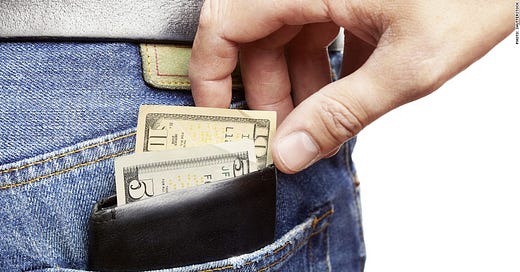Income Equivocation
The most dangerous place in the world is between a politician and your wallet.
The Supreme Court recently granted certiorari (i.e. they decided to hear) to Moore v U.S., a case that could have massive implications for those avaricious "what's yours is mine" "be thankful I don't take it all" big government politicians and their designs on all that is yours. Details of the dispute can be read here and here, but its crux is the definition of the word "income."
Should be simple, right?
Of course not, especially when Other People's Money is involved. As Hedley Lamarr noted, way back in 1874, "there is one thing standing between [politicians] and that property: the rightful owners."
The essence of the matter is whether unrealized gains should be treated as "income" for tax purposes. Let's say you purchased a thousand shares of Apple stock ten years ago. At $15 a share, that's a $15K investment. Today, as of the moment I type this, those shares are worth $188,150, for a 1250% gain. Factoring inflation (hold that thought), aka the 23% the dollar has lost in these past ten years, your gain comes to 963%. Still quite tasty.
Thing is, that's not actual income, as in money in your pocket. It is an appreciated asset, and for all we know it may continue to grow and grow well. However, the stock price might drop, and if it drops to, say, $150, you've "lost" nearly nineteen thousand dollars in asset value. Once again, that's not an actual loss. It only becomes "actual," i.e. income, i.e. a taxable event, when you sell the asset and realize a gain.
All this is plain-english interpretation of the word "income."
However, there are people of nefarious purpose (hello, Elizabeth Warren) who don't like the idea that some very successful folks haven't triggered taxation of their appreciated assets by selling them. That they continue to let those assets grow rather than cash out. That they're depriving Senator Fauxcahontas of the opportunity to spend some of that lucre.
As WSJ reports in the links I shared, the Moore case is about a couple who got caught up in some "sloppy language" aspect of the 2017 (aka "Trump") tax bill. The bill imposed a "one-time mandatory repatriation tax on foreign companies," which got interpreted in a fashion that dropped a $15,000 tax bill on Charles and Kathleen Moore. The Moores invested in a friend's company in India, and as reported, not only didn't sell any stock, they haven't received any income at all from that investment. The tax was based on "unrealized income," which by both law and precedent shouldn't be taxed.
A tax on unrealized income is better dubbed a wealth tax, and there is no provision in the Constitution for taxing wealth. That hasn't stopped the likes of Warren, Bernie Sanders, Kirsten Gillibrand, Sheldon Whitehouse, and other (Democrat or Democrat-adjacent) Congresscritters from lusting for it via their proposed "Ultra-Millionaire Tax Act."
Naked greed (on the politicians' part), envy, wrath, lust, and gluttony - a Deadly Sin pentafecta - and the reason I lamented at the open of the danger in standing between a politician and the fruit of your labor.
That a significant number of Americans support a wealth tax (always on someone else, never on themselves) should sadden us all. It also serves as a reminder of the importance of the Supreme Court, the tenets of limited government, and the peril of "pure democracy." The latter is, of course, two wolves and a sheep deciding what's for dinner, and it's the reason we are a Republic.
What happens when, should the wealth-suckers get their way, there are no more "ultra millionaires" to tax? When our most productive citizens are discouraged from working any more, because they won't get to keep what they earn? When "there are no rich no more," as Alvin Lee pondered?
This should be an easy one for this Court to sort out, though we should never count our Supreme chickens before they've hatched. Imagine the chaos, on the other hand, should the Court allow untaxed gains to be treated as wealth. Imagine an unrealized gains tax gets enacted. Every year, you, me, and everyone else who owns anything would have to value all our assets, including not just our portfolios but our homes, our cars, our jewelry, our collectibles, and anything else we have of value. Then, we'd have to sell some of that to pay the unrealized gains. On a national scale, that'll clobber asset values, destroy savings, crash stock prices and with them retirement portfolios (including public pensions), and basically upend the entire country. Sure, they wouldn't do that right away, and instead only pick on a handful of the very rich, but I remind you of the Alternative Minimum Tax, written in response to outrage that 155 wealthy Americans paid no income tax in one specific year, ensnared 5 million Americans the last year before it was reformed (by the same 2017 package that prompted the Moore case).
They never come for you at first, just people you are comfortable being targeted. But, they eventually do get to you, because their greed is bottomless.
A last word, especially relevant during this period of Biden-flation. Long-term capital gains, which are taxed differently than ordinary income, are not adjusted for inflation. That big gain you made on Apple? If you sold today, you'd be taxed on $173K (at 15% unless your household earns more than about $500K per year, plus a probable additional 3.8% in "Net Investment Income Tax"), but your actual, inflation-adjusted gain would only be $133K. That's $7300 in tax on money that the government evaporated via inflation. Next time someone complains that capital gains tax rates are lower than income tax rates, remind them of that great destroyer called inflation.




